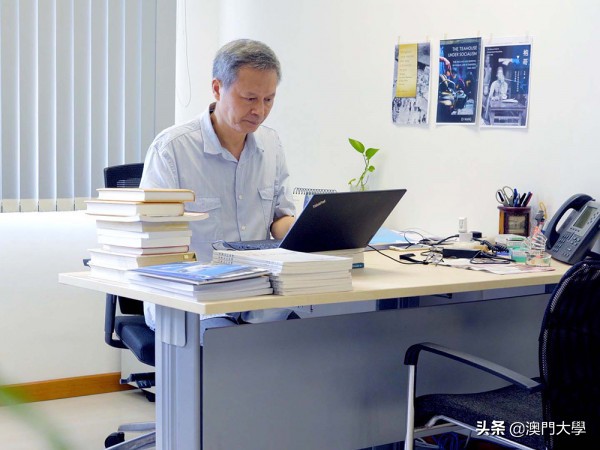Wang Di, Vice Dean of the Institute of Advanced Studies in Humanities and Social Sciences at the University of Macau for more than 40 years and Chair Professor of the Department of History, said: "Macao is a small historical city where Chinese and Western cultures blend, and UM also has a diverse environment between China and the West, which is conducive to historians to carry out research here. "Professor Wang's research focuses on the daily life of small people, and after living in Macao for six years, how can he bear new research fruits in this soil of the integration of Chinese and Western cultures?

Professor Wang Di
Born in Chengdu, Professor Wang Di was admitted to the History Department of Sichuan University with excellent results in 1978 and stayed on to teach after graduating with a master's degree in 1985. In 1991, he went to the United States as a visiting scholar at the Center for Chinese Studies at the University of Michigan, completed his Ph.D. at Johns Hopkins University in 1998, was a professor of history at A&m University in Texas, and was the former president of the Chinese Historical Society in the United States. In 2015, he taught at UM and served as Head of the Department of History until August 2021.
After Professor Wang Di went to the United States to pursue a doctorate in the 1990s, he focused his research on the daily life of small people. Professor Wang's fascinating "microhistory" focuses on the street discourse and public space of the common people, while daily life, social change and economic revenue and expenditure have become the carriers, presenting the bustle of the city to the rise and fall of the country, and connecting the people and the lifeblood of the country.
After coming to UM, Professor Wang Di has written a wealth of books and has published six monographs on Chinese and English studies.
After Wang Di came to UM, his research achievements were fruitful, and he attributed it to UM's international school-running model and the diversified campus culture of China and the West, "Macao is a city with more than 400 years of Chinese and Western cultural and historical background, and it is also a bridge city connecting China and foreign countries. As the only international comprehensive public university in Macau, UM itself has a good innate advantage, which is very suitable for historians to do research here. ”
"During my 17 years of teaching at American universities, I have only produced two books in English, because due to the geographical environment, it is difficult to collect information and topics," he said. But after coming to UM, many of the topics I had thought of before became possible, and in five years, in addition to six Chinese and English books, I also published 5 English papers and 16 Chinese papers, which is the most representative research in my 30 years. ”
Brother Robe: Violence and Order in the Rural Areas of Western Sichuan in the 1940s Chinese (left) and cover of the English version (right)
In the past few years at UM, he has published two important books, "Brother Robe: Violence and Order in the Rural Areas of Western Sichuan in the 1940s", and "Tea House: The Decline and Revival of Public Life in Chengdu", which have caused great social repercussions, the former winning the Best Academic Achievement Award of the Chinese Historical Association studying in the United States (2018) and the 2018 Best Book Award of the Chinese Association Party History Research Association, and winning the Top Ten Good Books of 2018 in several book lists, and the latter winning the Best Book Award of the American Society for Urban History. In addition, in the two books "The Disappearing Ancient City: Memories of Daily Life in Chengdu in the Late Qing Dynasty and early Ming Dynasty" and "Chengdu under the Microscope", Professor Wang studies how the changes in the lives of the general public, especially the lower classes, affect the system and habits of each class under the great changes in society. The former won cover news 'Hall of Fame: Top 10 Non-Fictions of 2019' book list. In addition, Professor Wang Di was also awarded the "Hall of Fame • Top Ten Writers of 2019".
Cover of "The Vanishing Ancient City: Memories of Daily Life in Chengdu in the Late Qing Dynasty and early Ming Dynasty"
For historical research, Professor Wang believes that it is a process of continuous exploration. He recalled that once a batch of precious manuscripts was found, several twists and turns, and finally the use of research funds to buy scanned copies of this batch of manuscripts, "historical research must be careful to find clues, if any clues are found in the process, you have to follow, and immediately go to the local area, if the information is missing, then the clues are interrupted." Only with information can we provide a basis for the writing of history, and without information, it is difficult for a woman to cook without rice. ”
Some of Professor Wang Di's writings were displayed at the UM Pavilion
Professor Wang believes that the study of history should also have a critical spirit, "just like the dust of history to find out the truth, this is a long-term process, because you have to analyze and discover what is the real history and where the real valuable ideas are." As a historian, insisting on collecting and criticizing the data will produce high-quality works. ”